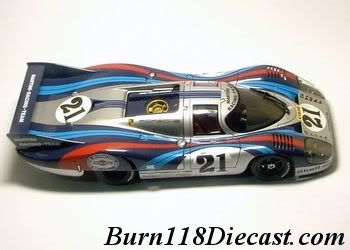
Porsche, as already mentioned
several times on this website, has had a great impact on motorsport throughout
the years. Although, till July 1968, Porsche was far less iconic than we know
nowadays. It is true that there were many victories, particularly at Le Mans,
but there was never an outright symbol of their power. That changed drastically
in July 1968. Porsche started a project on a new car, the 917. The Porsche 908
was starting to loose ground pretty fast over its competitors, namely Ferrari.
On 12th March 1969, the first 917 was displayed at the Geneva autoshow and by
the end of April of that year, the remaining 24 were completed. 25 were built
to comply with the Sport Category requirements.
As the project continued, the car started to result more unstable. Finally, the
917K was introduced. The 917K dominated a lot throughout the racing world,
particularly LeMans. The evolution produced yet another 917, the 917L, L for
longtail. It had a longer body than the K making it even more stable. This one
is the 917L chasis #42 which was raced in the 1971 LeMans. It did very well in
qualifying, getting the second best time only beaten by another L, chasis #43.
During the race, the car driven by Gerard Larrouse and Vic Elford was in third
position, however, the engine gave up and they were forced to quit. In that
year, a 917K from the same team (Martini International Racing Team) won LeMans.
Sadly, the Governing body recognised the true dominance of the 917 series and
changed the rules for less power. The 917 was not eligible to enter LeMans
again and Porsche backed out. Truely a waste as the 917L could have been
another winner. Porsche went to Can-Am where the 917 ,with the /10 and /30,
dominated and the Governing body had to revise the rules yet again.
AutoArt produces this model as part of their "Millenium" line-up. After the
917K series, they are now producing the 917L series which from the looks of it,
is going to be formed by 3 cars from 1970-1971 LeMans races. The model here is
perfect in stance and ride height, the paint job is superb and all the livery
is tampos. The livery is absolutely correct and beautiful. The wave like body
is accurately reproduced and all vents are made correctly and are not sealed.
However, the front mesh is not real, even if it looks allright, it is not real.
The front and back lights are superbly and accurately made. No visible
attachment stubs.
The model has realistic opening features, that is, the front compartment,
doors, and large rear engine cover. All shutlines are very small. AutoArt has
finally done it correct, all parts do stay open by themselves. The engine cover
has a tiny support rod which does it job well, but it looks absolutely fragile,
won't be playing a lot with that feature, but it is realistic.
The front compartment is pretty basic and true to the real car. A number of
wires, ducts and other components are incorporated, all to a pretty good level
of detail and realism.
The cockpit is nicely done. Parts are individualised and components are
coloured correctly and realistically. The gauges are very hard to see, but if
you look well, you can see some detail and that they are not made with a decal.
The seat is ok and the seatbelts are realistic and individualised.
The rear cover is particularly heavy but also very solid, the details under it
are superb. The engine bay is a pretty nice area, but it is also very hard to
see. A nice feature is that the fan on top of the engine, which is very
emblematic in the 917 series, does function and can be turned. You can notice
that much of the engine is hidden under a blue cover. A spare tyre and other
details can also be seen, all realistic and all wires and other parts are
coloured realistically. To really admire the large engine, one has to look at
the undercarriage. The engine is enourmous as well as very complicated. AutoArt
did a an excellent job under the rear engine cover. The detail seen from the
undercarriage could have been better, but for a middle range model, it's fair.
The wheels are very well made. Branded with Firestone, they are not slicks but
are threaded (lightly) very realistically. The front wheels are much narrower
than the backs. All four wheels have a brake disk (moves with tyre) and caliper
(static) but akwardly (not sure if this should be like this) only the rear
brake disks are drilled.
The undercarriage is pretty much sealed except for the already mentioned engine
area. The undercarriage has four screws that holds the model together and 2
holes which hold the model to the base while in it's styrofoam packaging.
Although coloured in black, they are still somewhat visible.
In conclusion, the model is fantastic and I am utterly satisfied with it for
its pricepoint, it is true that it doesn't come very cheap but you get what you
pay for. I truely reccomend this car to any Lemans and Porsche fan, but also to
any person that likes racing cars, maybe #21 did not do very brilliantly in the
race, but the beauty of the subject and livery is one of the best.
|
|
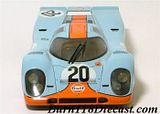
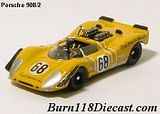
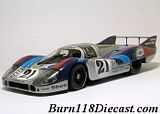
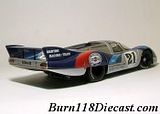
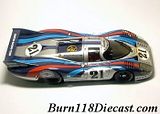

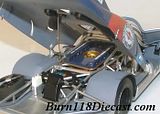

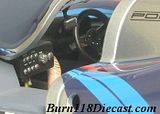
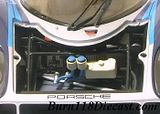
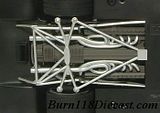
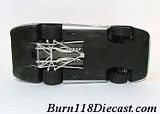
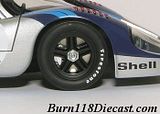
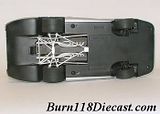
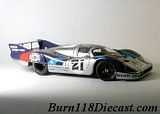
|
